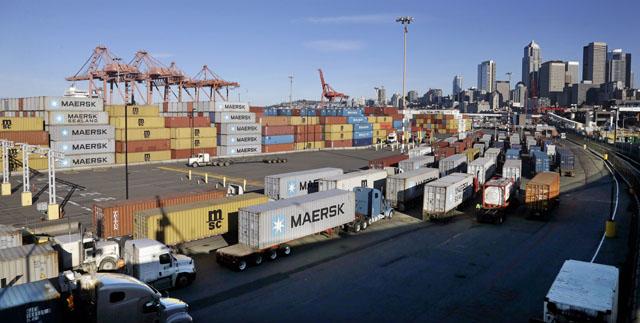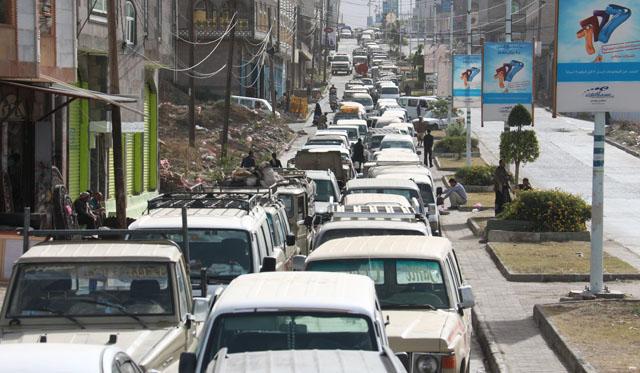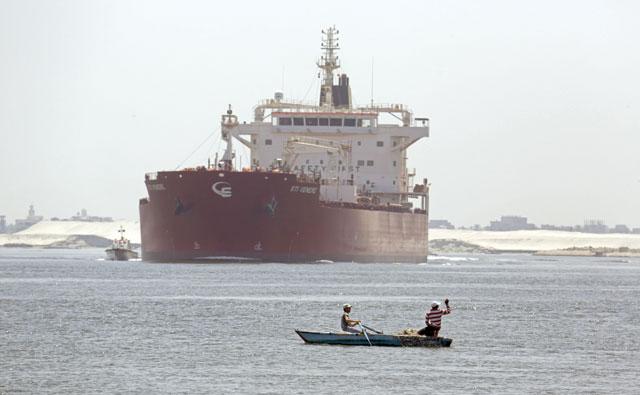You are here
Pressure mounts on shippers, union to settle US West Coast ports dispute
By Reuters - Feb 19,2015 - Last updated at Feb 19,2015

LOS ANGELES — Two US Cabinet secretaries joined congressional leaders, three governors and a big-city mayor on Wednesday in pushing shipping lines and the dockworkers' union to settle a contract dispute that has led to months of turmoil and cargo backups at 29 West Coast ports.
Labour Secretary Tom Perez and Commerce Secretary Penny Pritzker weighed in as emissaries of President Barack Obama, who has come under rising political pressure to intervene in a conflict that has reverberated through the trans-pacific commercial supply chain and could, by some estimates, cost the US economy billions of dollars.
Worsening cargo congestion that the union and shippers blame on each other has slowed freight traffic since October at the ports, which handle nearly half of all US maritime trade and more than 70 per cent of the country's imports from Asia.
More recently, the shipping companies have sharply curtailed operations at the terminals, suspending the loading and unloading of cargo vessels for night shifts, holidays and weekends at the five busiest ports.
Work has continued around the clock in the dockyards, rail yards and terminal gates for most of the ports. Some smaller ports remained open to nighttime vessel operations as well.
The union and shipping companies each accuse the other side of instigating the disruptions to gain leverage in contract negotiations that have dragged on for nine months, appearing to hit a roadblock in the last two weeks.
Arbitration cited in snagged talks
The bargaining agent for the shippers and terminal operators, the Pacific Maritime Association (PMA), has said talks hit a snag over a union demand for changes in the system of binding arbitration of contract disputes.
The International Longshore and Warehouse Union, representing 20,000 dockworkers, has insisted that an accord was near in the negotiations, which a federal mediator was assigned to oversee last month.
Perez joined the San Francisco talks for the first time on Tuesday, according to his spokeswoman, Xochitl Hinojosa, urging the parties to "come to an immediate agreement to prevent further damage to our economy".
He was joined for another round of talks on Wednesday, she said, by Pritzker and Los Angeles Mayor Eric Garcetti, whose city encompasses the nation's busiest cargo port and lies adjacent to the No. 2 cargo hub at Long Beach.
Sources familiar with the situation said Perez huddled with each party separately, then briefly together on Tuesday, and met with both sides again on Wednesday as negotiations and "sidebars" stretched into the evening.
Meanwhile, the governors of the three West Coast states, California, Oregon and Washington, all Democrats, issued a statement on Wednesday welcoming Perez' involvement and calling for a quick resolution to the dispute.
Separately, eight congressional Republicans who chair House or Senate panels with jurisdiction over transportation and labour sent a letter to Obama on Wednesday urging him to take further unspecified action if a settlement is not reached by March 2, two months from the date the federal mediator was appointed.
A Senate Commerce Committee spokeswoman, Lauren Hammond, said the letter's reference to "exercising additional leadership to resolve the situation" could be interpreted to mean invoking the 1947 Taft-Hartley Act.
Under that law, a president can seek a federal court order compelling the end to a work stoppage in a labour dispute if it poses a national emergency. But labour law experts have said it would be difficult to make such a case to a judge under current circumstances.
The union and the PMA have declined public comment since a federal mediator called for a news blackout last Friday.
The last time contract talks led to a full shutdown of the West Coast ports was in 2002, when the companies imposed a lockout that was lifted 10 days later under a court order sought by president George W. Bush under Taft-Hartley.
The labour dispute is disrupting supply chains across the Pacific, forcing some Asian exporters to resort to costly airfreight and pushing up shipping rates as more freighters are caught up in long lines to dock.
Japan's Honda Motor Co. said on Sunday it would slow production for a week at plants in Ohio, Indiana and Ontario, Canada, as parts it ships from Asia have been held up by the dispute, affecting models including the Civic, CR-V and Accord.
"We do not have a sufficient supply of several critical parts to keep the production lines running smoothly and efficiently," spokesman Mark Morrison said.
Honda and other carmakers have already started using airfreighters to transport some crucial parts from Asia to their US factories.
Fuji Heavy Industries Ltd., maker of Subaru cars, said it would continue flying parts to its US factory beyond an initial arrangement through the end of February, which it previously said would cost an extra 7 billion yen ($59 million) a month.
Toyota Motor Corp., which built about 2 million vehicles in North America last year, said it has reduced overtime at some factories as a result, while Nissan Motor Co. Ltd. said it had been slightly affected.
Rates rising
With dozens of ships caught up in lines for miles, many for more than a week, the rates to charter container ships have begun to climb.
"There's a lot of delays, and this is pushing up panamax [container] rates as fewer ships are available for new orders," a leading Singapore-based broker said.
A Shanghai index for US West Coast (USWC) freight rates rose 23 points last week to 2,265, and brokers said quotes had risen a further five points on Monday.
The dispute is also affecting volumes. Singapore-listed Neptune Orient Lines' container shipping unit reported an 8 per cent decline in the fourth quarter, partly because of fewer trans-pacific sailings as a result of the congestion.
Roberto Giannetta, secretary of the Hong Kong Liner Shipping Association, said the effects were being felt across the industry, as shippers looked for ways around the delays.
"All shipping lines are affected, and all shipping lines are making alternative arrangements one way or another, by... reallocating assets to the trans-pacific or redirecting cargo via the East Coast," he indicated.
Even if the dispute is resolved, there could be long-term consequences for the ports and the communities that depend on them.
"Trust in West Coast ports is at an all-time low, and the perception of supply chain risk is at an all-time high," said Peter Tirschwell, chief maritime analyst at the JOC Group, a supplier of US seaborne trade data. "We are entering another period of fundamental supply chain re-evaluation that is already leading some shippers to permanently abandon the West Coast."
For airfreighters, however, the crisis is an opportunity.
Hong Kong carrier Cathay Pacific Airways Ltd. reported on Monday that combined cargo and mail traffic figures for Cathay Pacific and its Dragonair subsidiary rose 12.5 per cent in January, outpacing a 2.7 per cent increase in passenger numbers, thanks to increased North American traffic.
"We saw a pickup in demand as January progressed, and by the end of the month we were operating close to a full freighter schedule," said Mark Sutch, its cargo sales and marketing manager.
Related Articles
International shipping lines are being forced to scale back or suspend port calls to Yemen as the conflict gets worse, putting pressure on supplies of food as prices rise in local markets.
AMMAN — The International Transport Workers' Federation (ITF) on Thursday provided the families of the victims of the Aqaba gas leak inciden
Bulldozers push earth and dredgers spit mud round-the-clock at Egypt's Suez Canal in a race to quickly expand the strategic waterway for two-way traffic, a project trumpeted by President Abdel Fattah Al Sisi to revive both the country's damaged economy and visions of nationalist glory.
















